2022年中考英语(人教版)一轮复习八年级上册Units 5-6课件(54张PPT)
文档属性
| 名称 | 2022年中考英语(人教版)一轮复习八年级上册Units 5-6课件(54张PPT) |  | |
| 格式 | pptx | ||
| 文件大小 | 1.0MB | ||
| 资源类型 | 试卷 | ||
| 版本资源 | 人教新目标(Go for it)版 | ||
| 科目 | 英语 | ||
| 更新时间 | 2022-01-16 16:45:13 | ||
图片预览


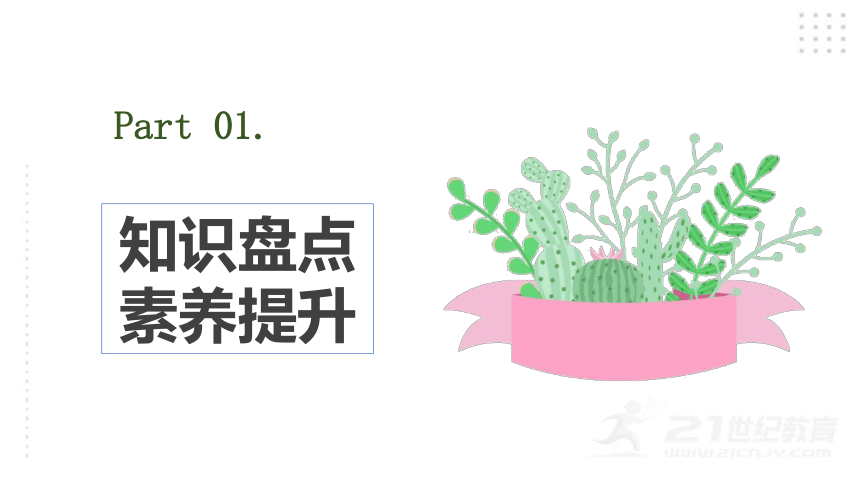
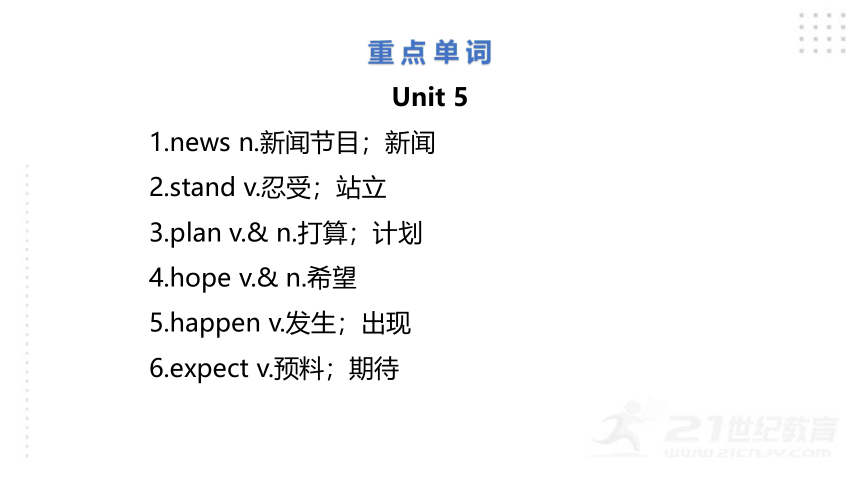
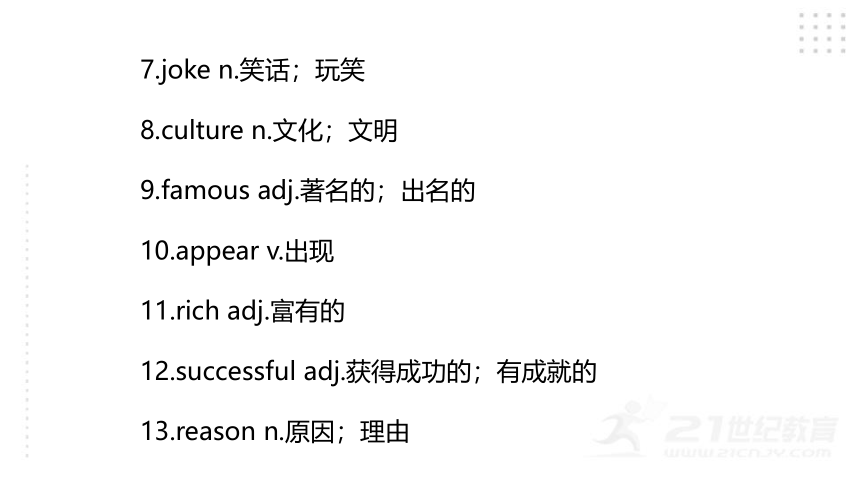
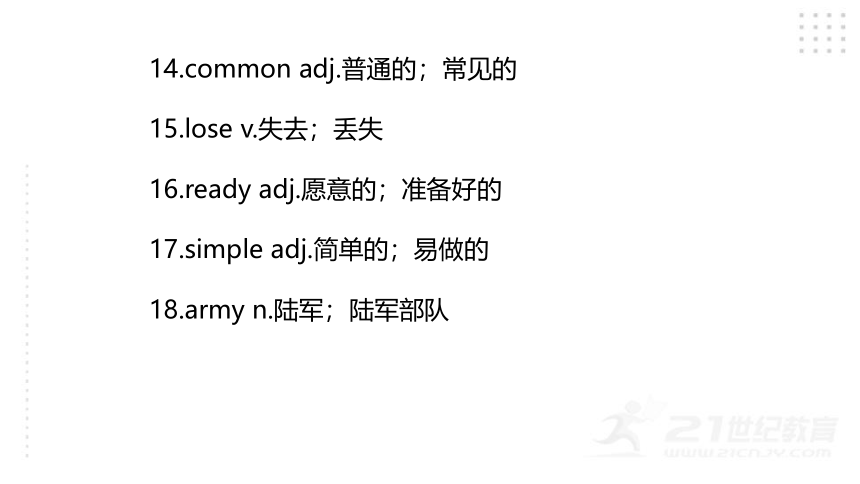
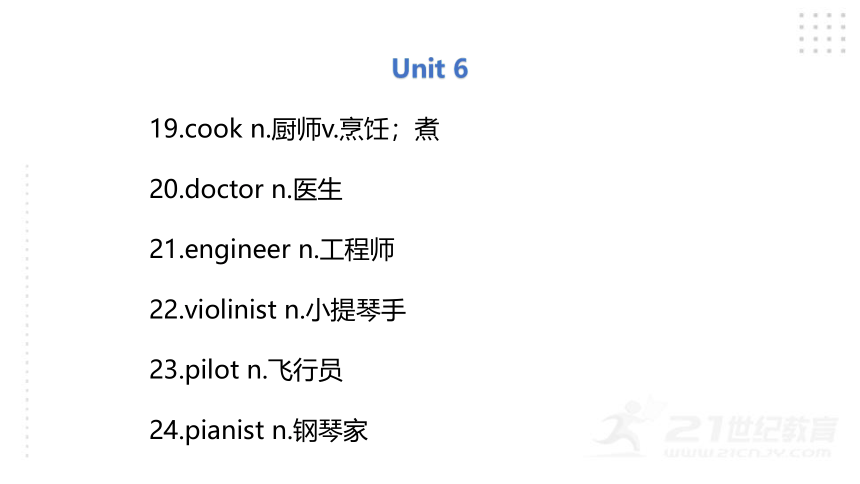
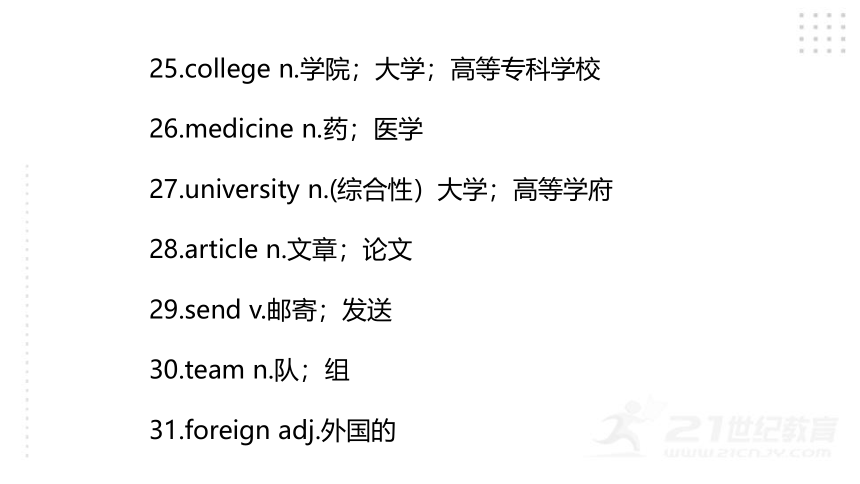
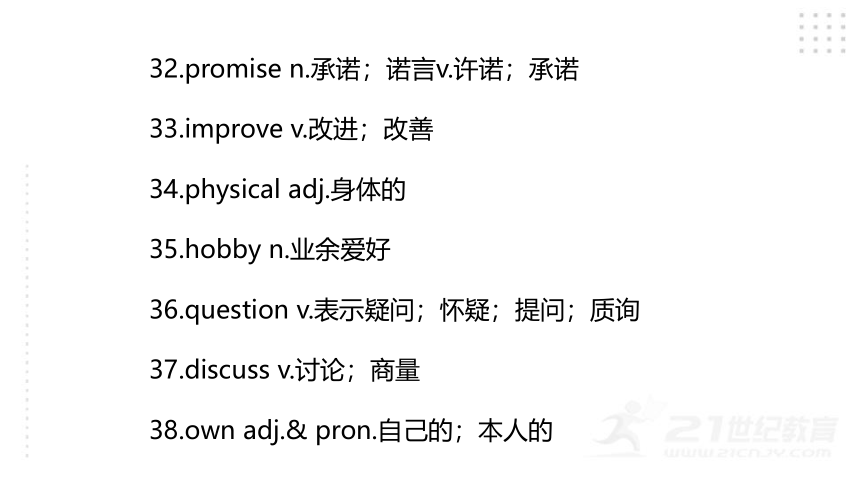
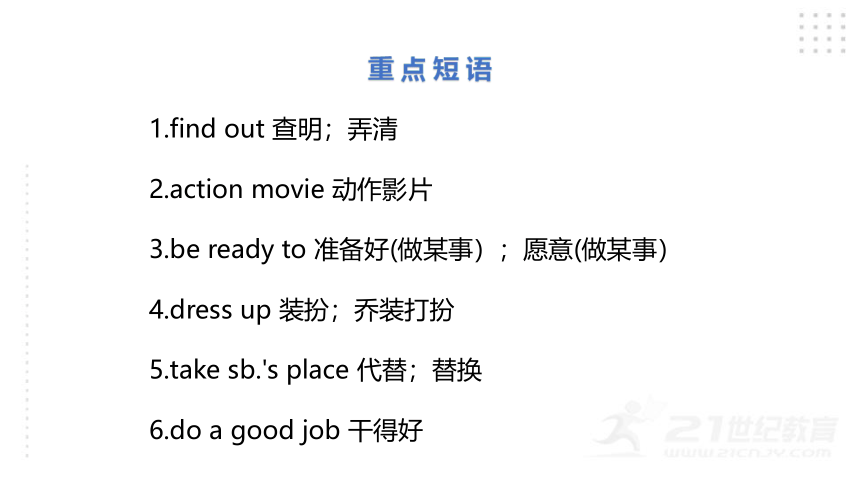
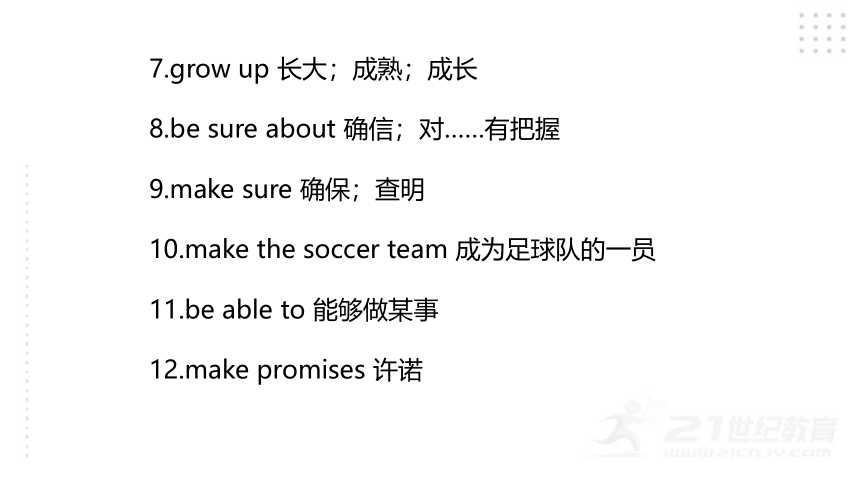
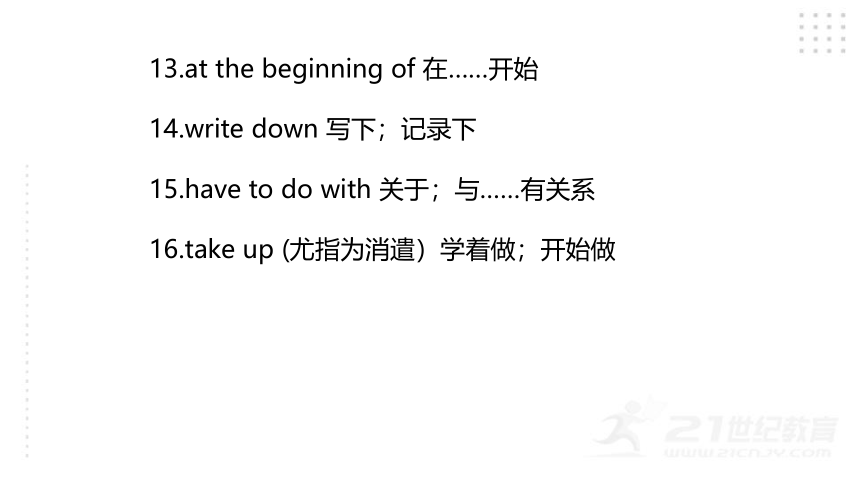
文档简介
(共54张PPT)
2
0
2
2
2022年中考英语一轮复习
课本梳理
人教(新目标)版
八年级上册
Units 5—6
知识盘点 素养提升
考点梳理 拓展素养
目录
content
01.
02.
Part 01.
知识盘点 素养提升
重 点 单 词
Unit 5
1.news n.新闻节目;新闻
2.stand v.忍受;站立
3.plan v.& n.打算;计划
4.hope v.& n.希望
5.happen v.发生;出现
6.expect v.预料;期待
7.joke n.笑话;玩笑
8.culture n.文化;文明
9.famous adj.著名的;出名的
10.appear v.出现
11.rich adj.富有的
12.successful adj.获得成功的;有成就的
13.reason n.原因;理由
mon adj.普通的;常见的
15.lose v.失去;丢失
16.ready adj.愿意的;准备好的
17.simple adj.简单的;易做的
18.army n.陆军;陆军部队
Unit 6
19.cook n.厨师v.烹饪;煮
20.doctor n.医生
21.engineer n.工程师
22.violinist n.小提琴手
23.pilot n.飞行员
24.pianist n.钢琴家
25.college n.学院;大学;高等专科学校26.medicine n.药;医学
27.university n.(综合性)大学;高等学府
28.article n.文章;论文
29.send v.邮寄;发送
30.team n.队;组
31.foreign adj.外国的
32.promise n.承诺;诺言v.许诺;承诺
33.improve v.改进;改善
34.physical adj.身体的
35.hobby n.业余爱好
36.question v.表示疑问;怀疑;提问;质询
37.discuss v.讨论;商量
38.own adj.& pron.自己的;本人的
重 点 短 语
1.find out 查明;弄清
2.action movie 动作影片
3.be ready to 准备好(做某事);愿意(做某事)
4.dress up 装扮;乔装打扮
5.take sb.'s place 代替;替换
6.do a good job 干得好
7.grow up 长大;成熟;成长
8.be sure about 确信;对……有把握
9.make sure 确保;查明
10.make the soccer team 成为足球队的一员
11.be able to 能够做某事
12.make promises 许诺
13.at the beginning of 在……开始
14.write down 写下;记录下
15.have to do with 关于;与……有关系
16.take up (尤指为消遣)学着做;开始做
词 汇 拓 展
1.stand v.→ stood (过去式/过去分词)忍受;站立
2.educate v.→ education n.教育
→ educational adj.教育的;有教育意义的
3.discuss v.→ discussion n.讨论;商量
4.mean v.→ meaning n.意义;意思
→ meaningful adj.有意义的
→ meaningless (反义词)毫无意义的;意思不明确的
5.act v.& n.→ action n.行动
6.culture n.→ cultural adj.文化的
7.become v.→ became (过去式)开始变得;变成
→ become (过去分词)8.successful adj.
→ successfully adv.成功地;顺利地
→ success n.成功
→ succeed v.成功
9.main adj.→ mainly adv.主要地
10.lucky adj.→ unlucky (反义词)不幸的;不吉利的
→ luckily adv.幸运地
→ luck n.幸运;运气
11.drive v.→ driver n.驾驶员;司机
12.science n.→ scientist n.科学家
13.medicine n.→ medical adj.医学的;医药的
14.send v.→ sent (过去式/过去分词)邮寄;发送
15.foreign adj.→ foreigner n.外国人
16.begin v.→ beginning n.开头;开端
17.improve v.→ improvement n.改进;改善
18.they pron.→ themselves (反身代词)他(她、它)们自己
19.week n.→ weekly adj.& adv.每周的(地)
20.person n.→ personal adj.个人的;私人的
重 点 句 型
1. What do you plan to watch tonight 你今晚打算看什么?
2. One of the main reasons is that Mickey was like a common man,but he always tried to face any danger.其中一个主要原因是米老鼠就像一个普通人,但他总是努力面对任何危险。
3.She dresses up like a boy and takes her father's place to fight in the army.她女扮男装,替父从军。
4.Just make sure you try your best .只要确保尽你自己最大的努力。
5.Most of the time,we make promises to other people.大多数时候,我们对他人做出承诺。
6.Sometimes the resolutions may be too difficult to keep.有时这些决定可能会太难而无法实现。
情 景 交 际
谈论喜好
1.—Why do you like watching the news 你为什么喜欢看新闻?
—Because I hope to find out what's going on around the world.因为我希望了解世界各地正在发生的事。
2.—What do you think of talk shows 你认为谈话节目怎么样?
—I don't mind them./I can't stand them!/I love watching them!我不介意它们。/我无法忍受它们!/我喜爱观看它们!谈论未来计划
3.—What do you want to be when you grow up 你长大后想当什么?
—I want to be an engineer./My parents want me to be a doctor,but I'm not sure about that.我想当一名工程师。/我父母想让我当一名医生,但我对那没有把握。
4.—How are you going to do that 你打算如何做到呢?
—I'm going to study math really hard.我要非常努力地学数学。
语 法
1.动词不定式作宾语
2.一般将来时(be going to)
Part 02.
考点梳理
素养提升
—What do you think of talk shows 你认为谈话节目怎么样?
—They're OK.I don't mind them.还行,我不介意。(Unit 5 P33)
【点拨】mind常用作动词,意为“介意;对(某事)烦恼”,其常见用法如下:
考点1
(1)后接名词、代词或动名词。常用于疑问句、否定句或条件句中。如:
I hope you don't mind the noise.我希望你不介意这声音。
(2)常用句型:Would/Do you mind sb./sb.'s doing sth./if+从句 意为“你介意……吗?”,表示礼貌地请求别人做某事。
常用答语:
表示介意:(I'm) sorry.../(You'd) better not.;
表示不介意:No,not at all./Of course not./Certainly not.。如:
—Would you mind me/my smoking here /Do you mind if I smoke here 你介意我在这儿抽烟吗?
—Better not.最好不要。
注意:mind (sb./sb.'s) doing sth.为mind+动名词的复合结构,当sb.为代词时,要用宾格形式,sb.'s可改为相应的形容词性物主代词。
【拓展】(1)Never mind.通常用于当别人向你致歉时,意为“没关系”。如:
—I'm sorry to bring you so much trouble.很抱歉给你带来这么多麻烦。
—Never mind.没关系。
(2)mind可用作名词,意为“头脑;心智;心思”等,常用短语如下:
make up one's mind (to do sth.)下定决心
(去做某事)
change one's mind改变主意
keep sth.in mind将……记在心中
1. Would you mind opening (打开) the window It's too hot inside.
( C )2.(2021·毕节)—Sam,what do you want to have for dinner
— .Anything will be OK for me.
A.My pleasure B.Good idea
C.I don't mind D.Beef,please
学以致用
( A )3.(2021·遂宁)—Would you mind lending me your ruler
— Here you are.
A.Of course not. B.I don't agree.
C.That's all right. D.Yes,I'd love to.
( B )4.(2021·甘肃)—Would you mind telling me how to start this machine
— .It's very easy.Do it like this.
A.Yes,of course
B.No,not at all
C.No,thanks
D.Yes,you are right
( B )5.(2021·达州)—Sorry!I missed the bus and arrived late.
— .Better late than never.
A.Not really B.Never mind
C.Take it seriously D.You are right
Do you plan to watch the news tonight
你今晚打算看新闻吗?(Unit 5 P34)
【点拨】plan意为“打算;计划”,其常见用法如下:
考点2
1.我们正打算明天去看望外婆。
We're planning to visit our grandma tomorrow.
( C )2.(2021·重庆A卷)The villagers plan a new bridge over the river.
A.build B.building
C.to build D.built
学以致用
I like to follow the story and see what happens next.我喜欢顺着故事情节往下看会发生什么。(Unit 5 P34)
【辨析】happen与take place两者都有“发生”的意思,具体区别如下:
考点3
单词/短语 含义及用法 例句
happen 指偶然“发生”,具有不可预测性,其结果往往给人带来麻烦或不幸。主语一般是物。常见用法:sth.happened to sb./sth.某人/物出了什么事情 What happened to her 她怎么了?
What's happened to your car?你的车出什么毛病了?
单词/短语 含义及用法 例句
take place 指有计划、有组织地在安排之内“发生”、“举行”。主语通常是物。 Great changes have taken place in my hometown in the past five years.在过去的五年间我的家乡发生了很大的变化。
共同点:(1)都不能用于被动语态。 (2)都不能与一段时间连用。 【拓展】happen的常用句型总结:
1.(2021·鄂尔多斯)改革开放以来,鄂尔多斯发生了巨大的变化。
Great changes have taken place in Ordos since China took the policy of reform and opening up.happentake place
2.(2021·宜宾改编)Cross?country races usually take place in all weather conditions,hot or cold.
3.—What happened to Tom
—He fell off his bike and hurt one of his legs.
学以致用
But one very famous symbol in American culture is a cartoon.但是在美国文化中,一个非常著名的标志是一部卡通片。(Unit 5 P37)
【点拨】 famous是形容词,意为“著名的;出名的”,相当于well-known,其常用短语及用法如下:
考点4
短语 含义 例句
be famous for+原因(特点、特长等) 以(因)……而出名 Austria is famous for its music.奥地利以音乐而闻名。
be famous as+身份、职业、地位等 作为……而出名 Lu Xun is famous as a great writer.鲁迅是位著名的大作家。
be famous to+人 为……所熟知 Confucius is famous to Chinese people.孔子为中国人所熟知。
( B )1. My hometown,Kunming,
is famous fresh flowers.No matter when you visit ______it,they will catch your eye.
A.as B.for C.of D.by
学以致用
2.(2021·安顺改编)Guizhou is famous for Huangguoshu Waterfall and Moutai in the world.
3.Yao Ming is famous to most young people.
4.Thomas Edison is famous as a great inventor.
5.As is known to all,Taiwan belongs to China.
Sometimes the resolutions may be too difficult to keep.有时这些决定可能会太难而无法实现。(Unit 6 P45)
【点拨】too ...to ...句型形式是肯定的,但表达否定意义,意为“太……而不能……”。too是副词,后接形容词或副词的原级;to是不定式符号,后接动词原形,构成动词不定式。如:
考点5
He's too young to join the army.他年龄太小,不能参军。
【拓展】(1)too ...to ...句型中的to前加for sb.时,表示的是动词不定式的逻辑主语。如:The task is too difficult for me to finish.这项任务太难了,我完成不了。
(2) too ...to ...句型可以转换为not ...enough to ...或so ...that ...句型。
( A )1.The man in blue is old to finish the difficult task in such a short time.
A.too B.very C.so D.such
2.The girl is too young to dress herself.(改为同义句)
The girl isn't old enough to dress herself.
=The girl is so young that she can't dress herself.
学以致用
3.(2021·重庆B卷)地震后,医护人员工作太忙,没有得到充分的休息。
After the earthquake,doctors and nurses were too busy to take enough rest.
4.(2021·广州)这个艺术展览太精彩了,不容错过。
The art show is too wonderful to miss.
学以致用
2
0
2
2
2022年中考英语一轮复习
课本梳理
人教(新目标)版
八年级上册
Units 5—6
知识盘点 素养提升
考点梳理 拓展素养
目录
content
01.
02.
Part 01.
知识盘点 素养提升
重 点 单 词
Unit 5
1.news n.新闻节目;新闻
2.stand v.忍受;站立
3.plan v.& n.打算;计划
4.hope v.& n.希望
5.happen v.发生;出现
6.expect v.预料;期待
7.joke n.笑话;玩笑
8.culture n.文化;文明
9.famous adj.著名的;出名的
10.appear v.出现
11.rich adj.富有的
12.successful adj.获得成功的;有成就的
13.reason n.原因;理由
mon adj.普通的;常见的
15.lose v.失去;丢失
16.ready adj.愿意的;准备好的
17.simple adj.简单的;易做的
18.army n.陆军;陆军部队
Unit 6
19.cook n.厨师v.烹饪;煮
20.doctor n.医生
21.engineer n.工程师
22.violinist n.小提琴手
23.pilot n.飞行员
24.pianist n.钢琴家
25.college n.学院;大学;高等专科学校26.medicine n.药;医学
27.university n.(综合性)大学;高等学府
28.article n.文章;论文
29.send v.邮寄;发送
30.team n.队;组
31.foreign adj.外国的
32.promise n.承诺;诺言v.许诺;承诺
33.improve v.改进;改善
34.physical adj.身体的
35.hobby n.业余爱好
36.question v.表示疑问;怀疑;提问;质询
37.discuss v.讨论;商量
38.own adj.& pron.自己的;本人的
重 点 短 语
1.find out 查明;弄清
2.action movie 动作影片
3.be ready to 准备好(做某事);愿意(做某事)
4.dress up 装扮;乔装打扮
5.take sb.'s place 代替;替换
6.do a good job 干得好
7.grow up 长大;成熟;成长
8.be sure about 确信;对……有把握
9.make sure 确保;查明
10.make the soccer team 成为足球队的一员
11.be able to 能够做某事
12.make promises 许诺
13.at the beginning of 在……开始
14.write down 写下;记录下
15.have to do with 关于;与……有关系
16.take up (尤指为消遣)学着做;开始做
词 汇 拓 展
1.stand v.→ stood (过去式/过去分词)忍受;站立
2.educate v.→ education n.教育
→ educational adj.教育的;有教育意义的
3.discuss v.→ discussion n.讨论;商量
4.mean v.→ meaning n.意义;意思
→ meaningful adj.有意义的
→ meaningless (反义词)毫无意义的;意思不明确的
5.act v.& n.→ action n.行动
6.culture n.→ cultural adj.文化的
7.become v.→ became (过去式)开始变得;变成
→ become (过去分词)8.successful adj.
→ successfully adv.成功地;顺利地
→ success n.成功
→ succeed v.成功
9.main adj.→ mainly adv.主要地
10.lucky adj.→ unlucky (反义词)不幸的;不吉利的
→ luckily adv.幸运地
→ luck n.幸运;运气
11.drive v.→ driver n.驾驶员;司机
12.science n.→ scientist n.科学家
13.medicine n.→ medical adj.医学的;医药的
14.send v.→ sent (过去式/过去分词)邮寄;发送
15.foreign adj.→ foreigner n.外国人
16.begin v.→ beginning n.开头;开端
17.improve v.→ improvement n.改进;改善
18.they pron.→ themselves (反身代词)他(她、它)们自己
19.week n.→ weekly adj.& adv.每周的(地)
20.person n.→ personal adj.个人的;私人的
重 点 句 型
1. What do you plan to watch tonight 你今晚打算看什么?
2. One of the main reasons is that Mickey was like a common man,but he always tried to face any danger.其中一个主要原因是米老鼠就像一个普通人,但他总是努力面对任何危险。
3.She dresses up like a boy and takes her father's place to fight in the army.她女扮男装,替父从军。
4.Just make sure you try your best .只要确保尽你自己最大的努力。
5.Most of the time,we make promises to other people.大多数时候,我们对他人做出承诺。
6.Sometimes the resolutions may be too difficult to keep.有时这些决定可能会太难而无法实现。
情 景 交 际
谈论喜好
1.—Why do you like watching the news 你为什么喜欢看新闻?
—Because I hope to find out what's going on around the world.因为我希望了解世界各地正在发生的事。
2.—What do you think of talk shows 你认为谈话节目怎么样?
—I don't mind them./I can't stand them!/I love watching them!我不介意它们。/我无法忍受它们!/我喜爱观看它们!谈论未来计划
3.—What do you want to be when you grow up 你长大后想当什么?
—I want to be an engineer./My parents want me to be a doctor,but I'm not sure about that.我想当一名工程师。/我父母想让我当一名医生,但我对那没有把握。
4.—How are you going to do that 你打算如何做到呢?
—I'm going to study math really hard.我要非常努力地学数学。
语 法
1.动词不定式作宾语
2.一般将来时(be going to)
Part 02.
考点梳理
素养提升
—What do you think of talk shows 你认为谈话节目怎么样?
—They're OK.I don't mind them.还行,我不介意。(Unit 5 P33)
【点拨】mind常用作动词,意为“介意;对(某事)烦恼”,其常见用法如下:
考点1
(1)后接名词、代词或动名词。常用于疑问句、否定句或条件句中。如:
I hope you don't mind the noise.我希望你不介意这声音。
(2)常用句型:Would/Do you mind sb./sb.'s doing sth./if+从句 意为“你介意……吗?”,表示礼貌地请求别人做某事。
常用答语:
表示介意:(I'm) sorry.../(You'd) better not.;
表示不介意:No,not at all./Of course not./Certainly not.。如:
—Would you mind me/my smoking here /Do you mind if I smoke here 你介意我在这儿抽烟吗?
—Better not.最好不要。
注意:mind (sb./sb.'s) doing sth.为mind+动名词的复合结构,当sb.为代词时,要用宾格形式,sb.'s可改为相应的形容词性物主代词。
【拓展】(1)Never mind.通常用于当别人向你致歉时,意为“没关系”。如:
—I'm sorry to bring you so much trouble.很抱歉给你带来这么多麻烦。
—Never mind.没关系。
(2)mind可用作名词,意为“头脑;心智;心思”等,常用短语如下:
make up one's mind (to do sth.)下定决心
(去做某事)
change one's mind改变主意
keep sth.in mind将……记在心中
1. Would you mind opening (打开) the window It's too hot inside.
( C )2.(2021·毕节)—Sam,what do you want to have for dinner
— .Anything will be OK for me.
A.My pleasure B.Good idea
C.I don't mind D.Beef,please
学以致用
( A )3.(2021·遂宁)—Would you mind lending me your ruler
— Here you are.
A.Of course not. B.I don't agree.
C.That's all right. D.Yes,I'd love to.
( B )4.(2021·甘肃)—Would you mind telling me how to start this machine
— .It's very easy.Do it like this.
A.Yes,of course
B.No,not at all
C.No,thanks
D.Yes,you are right
( B )5.(2021·达州)—Sorry!I missed the bus and arrived late.
— .Better late than never.
A.Not really B.Never mind
C.Take it seriously D.You are right
Do you plan to watch the news tonight
你今晚打算看新闻吗?(Unit 5 P34)
【点拨】plan意为“打算;计划”,其常见用法如下:
考点2
1.我们正打算明天去看望外婆。
We're planning to visit our grandma tomorrow.
( C )2.(2021·重庆A卷)The villagers plan a new bridge over the river.
A.build B.building
C.to build D.built
学以致用
I like to follow the story and see what happens next.我喜欢顺着故事情节往下看会发生什么。(Unit 5 P34)
【辨析】happen与take place两者都有“发生”的意思,具体区别如下:
考点3
单词/短语 含义及用法 例句
happen 指偶然“发生”,具有不可预测性,其结果往往给人带来麻烦或不幸。主语一般是物。常见用法:sth.happened to sb./sth.某人/物出了什么事情 What happened to her 她怎么了?
What's happened to your car?你的车出什么毛病了?
单词/短语 含义及用法 例句
take place 指有计划、有组织地在安排之内“发生”、“举行”。主语通常是物。 Great changes have taken place in my hometown in the past five years.在过去的五年间我的家乡发生了很大的变化。
共同点:(1)都不能用于被动语态。 (2)都不能与一段时间连用。 【拓展】happen的常用句型总结:
1.(2021·鄂尔多斯)改革开放以来,鄂尔多斯发生了巨大的变化。
Great changes have taken place in Ordos since China took the policy of reform and opening up.happentake place
2.(2021·宜宾改编)Cross?country races usually take place in all weather conditions,hot or cold.
3.—What happened to Tom
—He fell off his bike and hurt one of his legs.
学以致用
But one very famous symbol in American culture is a cartoon.但是在美国文化中,一个非常著名的标志是一部卡通片。(Unit 5 P37)
【点拨】 famous是形容词,意为“著名的;出名的”,相当于well-known,其常用短语及用法如下:
考点4
短语 含义 例句
be famous for+原因(特点、特长等) 以(因)……而出名 Austria is famous for its music.奥地利以音乐而闻名。
be famous as+身份、职业、地位等 作为……而出名 Lu Xun is famous as a great writer.鲁迅是位著名的大作家。
be famous to+人 为……所熟知 Confucius is famous to Chinese people.孔子为中国人所熟知。
( B )1. My hometown,Kunming,
is famous fresh flowers.No matter when you visit ______it,they will catch your eye.
A.as B.for C.of D.by
学以致用
2.(2021·安顺改编)Guizhou is famous for Huangguoshu Waterfall and Moutai in the world.
3.Yao Ming is famous to most young people.
4.Thomas Edison is famous as a great inventor.
5.As is known to all,Taiwan belongs to China.
Sometimes the resolutions may be too difficult to keep.有时这些决定可能会太难而无法实现。(Unit 6 P45)
【点拨】too ...to ...句型形式是肯定的,但表达否定意义,意为“太……而不能……”。too是副词,后接形容词或副词的原级;to是不定式符号,后接动词原形,构成动词不定式。如:
考点5
He's too young to join the army.他年龄太小,不能参军。
【拓展】(1)too ...to ...句型中的to前加for sb.时,表示的是动词不定式的逻辑主语。如:The task is too difficult for me to finish.这项任务太难了,我完成不了。
(2) too ...to ...句型可以转换为not ...enough to ...或so ...that ...句型。
( A )1.The man in blue is old to finish the difficult task in such a short time.
A.too B.very C.so D.such
2.The girl is too young to dress herself.(改为同义句)
The girl isn't old enough to dress herself.
=The girl is so young that she can't dress herself.
学以致用
3.(2021·重庆B卷)地震后,医护人员工作太忙,没有得到充分的休息。
After the earthquake,doctors and nurses were too busy to take enough rest.
4.(2021·广州)这个艺术展览太精彩了,不容错过。
The art show is too wonderful to miss.
学以致用
